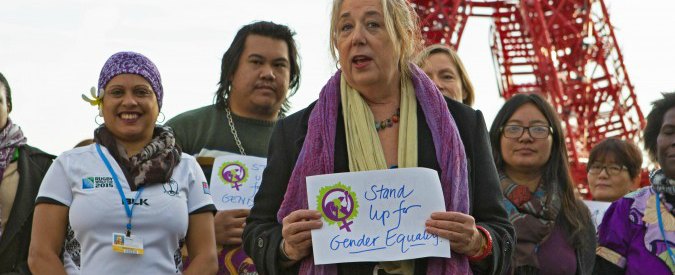
Climate justice: what it represents for women’s rights?
Climate justice is one of the most topical issues in the international debate on climate change. The weakest members of society should not suffer the consequences of uncontrolled economic development in the form of pollution, poverty and social oppression and, moreover, freedom from such adverse conditions is now deemed to be a fundamental human right, especially in the case of women and children. The theme of climate justice was, in fact, a primary issue of debate at the ‘COP 21’ conference on climate change organised by the United Nations in Paris in 2015.
While the intention has always been to reach a new agreement concerning climatic conditions that may be considered “fair and ambitious” on the basis of customary expectations, in this case, efforts were made to ensure that the principle of climate justice might actually become a binding element of such policies.
The term ‘climate justice’ appeared for the first time in 1999 in an article published by the CorpWatch organisation entitled “Greenhouse Gangsters vs. Climate Justice”. The term ‘greenhouse gangsters’ refers to the industrialised countries responsible for most of the pollution from fossil fuels occurring at the expense of nations that suffer the injustice of now demonstrable climatic consequences. The influence assumed by the campaign in the international debate led to the establishment in 2002 of the Climate Justice Summit, a summit meeting held in parallel with the COP 6 conference at the Hague in the Netherlands. The aim of this first event was to emphasise that the populations exposed to the effects of global warming have no say in negotiations and how climate change is not simply a political and economic problem but above all a social issue, having particular reference to the status of women and children.
Now, fourteen years later, thanks to the growth of global debate and the creation of regional committees on climate justice, the central position of women in this claim has been consolidated. Climate justice is a catalyst for women in the struggle to achieve gender equity. Climate change exacerbates the vulnerable condition in which millions of people live every day, amplifying discrimination and issues already existing within the societies that suffer from the consequences of the phenomenon. Recognising this situation means recognising the link between such circumstances and human rights. Women are discriminated against to varying degrees in many countries and in some countries, in particular, the limitations they experience, combined with the effects of climate change, are so severe as to endanger their very survival. Thanks to the debate on climate justice there has been a growing awareness in the international community of the need to introduce a gender perspective in any environmental action.
Despite the good intentions, however, the enormous interests that gravitate around the environmental protection policies tended to limit the position of many national representatives at the COP 21 conference in Paris. It thus occurred that the issue of climate justice was dropped from the most significant part of the final treaty, with just a reference remaining in the non-binding preamble. The question of gender equality suffered a similar fate as the issue was present in the preamble and in the binding part of the text but in such general terms and in a manner that leaves doubt concerning its effectiveness. Despite the disappointment, the advocacy activities of feminist organisations have certainly not been curtailed. The Paris conference might have led to a result having a greater impact, but there was the constant awareness that this event was only the first step in a long process of recognition. Climate justice is, in fact. a revolutionary principle that focuses on a need for a structural change in the energy supply system, and the entire human race must be involved in that process. This may be seen as a decidedly ambitious challenge fraught with various obstacles.
Chiara Soletti
Published for Italian Climate Network on Il Fatto Quotidiano.
